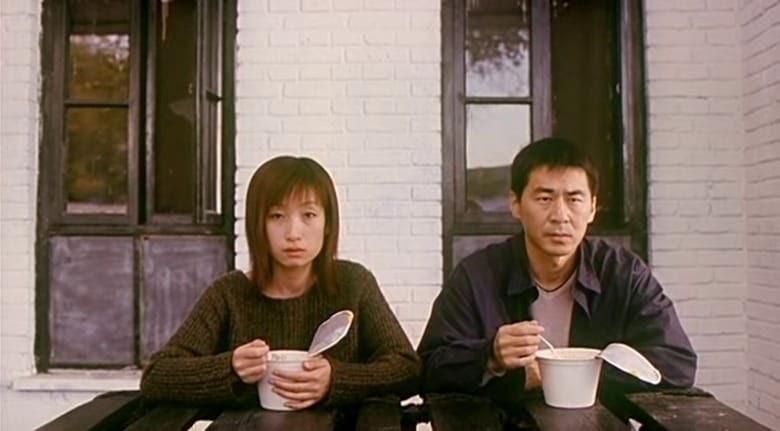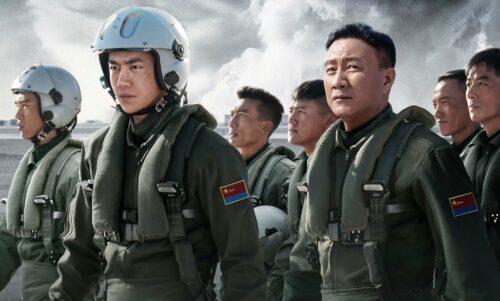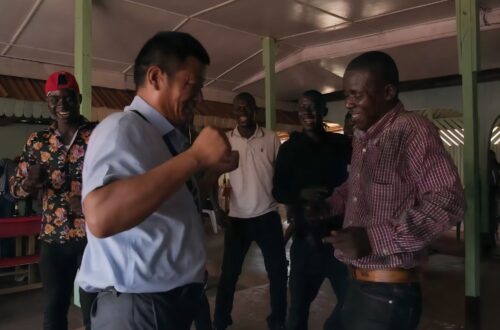‘Chicken Poets’: Meng Jinghui’s absurdist comedy explores art in an artless world

April is National Poetry Month, and in honor of that, we present Chicken Poets, a film about a poet who struggles to fit inside modern, materialistic China. Like the best absurdist works, it’s both funny and sad as it examines the value of art in a world that increasingly disregards it.

For nearly three decades now, stage director Mèng Jīnghuī 孟京辉 has been one of the best-known figures in China’s avant-garde theater scene. Meng’s work is absurdist and experimental, taking on both new material and old standards. In Meng’s hands, Dario Fo’s Accidental Death of an Anarchist parodied Chinese drama and society, including jabs at Lǎo Shě’s 老舍 Teahouse (茶馆 Cháguǎn), a staple of 20th century theater. Even in his 50s, Meng’s blend of dark humor and postmodernism is still raising eyebrows. Last year, his own techno-scored spin on Teahouse replaced the play’s eponymous building with a giant wheel. The production, which played at a festival in Avignon, France, divided critics and provoked some audience members to walk out.
Having enjoyed so much success (and controversy), Meng hasn’t been able to escape accusations of selling out. Some critics have complained that his newer work is too safe, sacrificing experimentation for commercialization. I have no idea how many fans were tossing this accusation back in the early 2000s, but it’s oddly appropriate that Meng’s only work as a film director took this common artistic crime as its main theme. Chicken Poets (像鸡毛一样飞 xiàng jīmáo yīyàng fēi) (2002), written by Meng’s wife and collaborator Liào Yīméi 廖一梅, features a poet who struggles to fit inside modern, materialistic China. Like the best absurdist works, it’s both funny and sad as it examines the value of art in a world that increasingly disregards it.
At an age when his peers are working and raising a family, 31-year-old Ouyang Yunfei has only a bean-bag pillow and poetry collection to his name. Yunfei has dreamed of being a poet since he was a kid, but his dream hasn’t been a very successful one. Plagued with writer’s block, Yunfei visits an old college friend at a small airport town. Unlike Yunfei, Chen Xiaoyang is a man who’s eager to follow the times. Since graduation, he’s traded poetry for business, setting up a black chicken farm. He invites Yunfei to live and work with him, boasting that the entire country will soon be eating eggs from black chickens.
At the hotel where he stays with Xiaoyang, Yunfei strikes up a friendship with a receptionist, Fangfang. The young woman dreams of being a flight attendant, but the airport rejects her because she’s colorblind. Although Yunfei might feel worthless, the idealistic Fangfang recognizes his gift. She believes being a poet is a special calling, and spreads the word around town about Yunfei. When a local man asks Yunfei to write a poem for his new bride, Yunfei is baffled. In a confrontation with Fangfang, he insists that he only breeds chickens. “Because today,” he says, “people need eggs, not poems.”
Eventually, Yunfei relents, and the groom is glad to get his poem. Even though Yunfei’s work inspires people like Fangfang, who calls his poems the missing colors in her life, Yunfei can’t shake his wishes for fame and fortune. What good is poetry, really, if you’re sleeping on a friend’s couch and cracking eggs? One night, while walking home, Yunfei strikes a Faustian bargain. A bootleg CD pirate offers him a magical disk that will turn him into a famous poet. “In the past, if you wanted one, you’d have to trade your soul,” the pirate observes. “Now it only costs $10.” After playing the CD, which creates his poetry for him, Yunfei becomes a success overnight. He mingles with the literati, writes advertisement jingles, and appears on talk shows. The price, as far as Fangfang is concerned, is more than $10.
Despite its director’s theatrical background, Chicken Poets is confidently cinematic, doing things that Meng couldn’t possibly do on stage. In one of its best scenes, a Yunfei-penned song-and-dance ad for a supermarket praises Coca-Cola and the World Trade Organization. The chorus enthuses that “Our lives are like poetry” as they turn into colorful cartoons and dance with balloons, dollar signs, and grocery products. There’s also a clever thoughtfulness to the movie’s construction. Scenes criticizing commercialism, like the song-and-dance ad and a rhythmic demonstration of Xiaoyang’s production process, are filmed in a flashy, hollow style. More human moments, like scenes between Fangfang and Yunfei, are slower-paced, rendered in black-and-white and long shots.
As an allegorical fantasy, Chicken Poets unfortunately has a struggle in depicting its cast as more than symbols. Xiaoyang, for example, comes across as a simple tǔháo 土豪 parody rather than a multidimensional character. Fangfang, the movie’s representative of youthful idealism, isn’t developed much further, either. Still, while characterization might not be its strong point, Chicken Poets delights with its absurdist imagination and hilarious exploration of art in an artless world.
Ouyang Yunfei truly speaks for every downbeat artist when he gets back up again and walks off into the unknown, uncertain but confident, his head shaved like his idol Vladimir Mayakovsky.
Film Friday is The China Project’s film recommendation column. Have a recommendation? Get in touch: editors@thechinaproject.com





